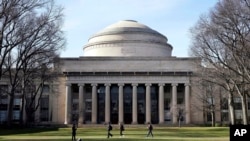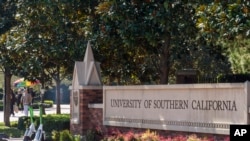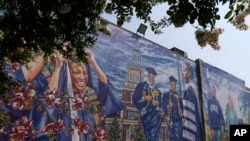Student Union
US Universities Express Confidence About Return of Foreign Students
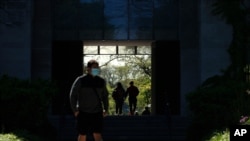
An overwhelming majority—86%—of U.S. colleges, universities and other learning programs for higher education plan to bring international students back to campus to study in person in fall 2021.
“Universities are prepping for a strong recovery in international education enrollment as they emerge from the [COVID-19] pandemic,” said Mirka Martel, head of research for the Institute of International Education (IIE) in New York.
IIE has been tracking international student mobility and the effects of the COVID-19 pandemic on international student travel to and from the United States since February 2020, when the pandemic started to surge in the U.S.
“We release this report more than a year later with a cautiously optimistic outlook on international educational exchange,” IIE wrote in its report released June 10.
“With vaccination rates on the rise in the United States, we note concerted efforts by U.S. higher education institutions to reopen their campuses and encourage all students, including international students, to return to in-person study,” the report stated.
COVID-19 causes fewer hospitalizations and deaths in young people than in the aged, and many young people who caught COVID-19 were asymptomatic.
But because younger people in university settings are both clustered and mobile—interacting among themselves and traveling from campus to home or vacation spots— authorities are eager for them to be vaccinated before school resumes in the fall 2021.
"We would love for all our students to be vaccinated before they go home to either places in the U.S. or places in other countries, because if they go there unvaccinated, they could actually carry the virus to their families and communities," Gerri Taylor, co-chair of American College Health Association's COVID-19 Task Force outside Washington, told VOA in April.
IIE noted the unevenness of vaccination around the world, including places where international students travel from their home countries to their colleges and universities in the U.S.
“At the same time, variable vaccination rates worldwide and the recent outbreaks in India, Latin America, and other locations remind us that institutions will continue to grapple with COVID-19 in promoting a return to in-person study for international students from those regions,” the report stated.
IIE also reported that nearly two thirds of institutions (64%) plan to make COVID-19 vaccines available to students, faculty, and staff on campus, including international students.
But 45% do not plan to require a vaccine before students arrive on campus. Only 14% of institutions have a requirement in place. Most colleges and universities (55%) are still deliberating whether to require COVID-19 vaccinations for students pursuing in-person study abroad, the survey stated.
Among the more than 1 million international students enrolled in the U.S., more than half come from China and India combined, 34.6% and 18%, respectively.
“While institutions are beginning to restart in-person study abroad opportunities for U.S. students, colleges and universities are taking a cautious approach given the uncertainties of global travel at this point in time,” IIE stated.
IIE conducted this survey from April 15 to May 5, 2021. Among more than 1,300 higher education institutions who were sent the survey in the United States and abroad, 414 institutions responded. These institutions represented 44% of all international students at U.S. institutions in the 2019-2020 academic year, the report stated.
Among other findings, IIE noted that international student applications to U.S. universities and colleges are increasing, in line with a resumption of more normal life on American campuses, except community colleges, where applications declined 58%.
See all News Updates of the Day
Malaysian official: Schools can’t turn away from global tensions

Zambry Abdul Kadir, Malaysia’s higher education minister, said protests spreading across universities in the United States show that schools can’t ignore political tensions.
Helen Packer, reporting in Times Higher Education, said the minister reminded educators that universities are key in the development of leaders, individuals and societies. (April 2024)
Social media breaks are difficult, but necessary

Between online classes, maintaining social connections and working on projects, college students can have a hard time disengaging from the demands of technology.
In Florida International University’s PantherNOW, Ariana Rodriguez offers strategies for taking a break from social media. (April 2024)
- By Melos Ambaye
Many master's degrees aren't worth the investment, research shows
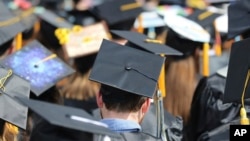
Nearly half of master's degrees have a negative financial return, according to new research by the Foundation for Research on Equal Opportunity, an economic research organization.
The study indicates that many graduate degree programs do not increase lifetime earnings enough to be worth it.
While 23% of bachelor’s degree programs yield a negative financial return on investment, 43% of two-year degrees and master’s degrees fail to deliver a return, according to the study by Preston Cooper, a senior fellow at FREOPP.
Cooper assessed the return on investment for 53,000 degree and certificate programs to determine whether a student’s lifetime earnings outweigh program costs and the risk of not completing their degree.
His findings show that a student’s field of study was the overriding indicator of return on investment at the undergraduate and graduate level.
Engineering, computer science and nursing bachelor’s degrees have high financial returns on investment, while programs in education, fine arts, psychology and English usually have low returns.
Graduate degrees in medicine and law tend to have strong payoffs. But a large share of master’s programs, including the MBA, frequently have low payoffs, according to Cooper.
Although workers with master’s degrees earn 16% more than those with only bachelor’s degrees, Cooper says the figure fails to account for students who had “higher preexisting earnings potential.”
“MBA students typically have high preexisting earnings potential, having often chosen high-ROI undergraduate majors such as finance and economics,” Cooper writes. “So the MBA adds little value on top of that.”
The study indicates that high starting salaries are predictors of high returns on investment. Degrees with starting salaries of $57,000 a year or more deliver the best lifetime returns.
But the return on investment of a degree can vary depending on the educational institution.
“Students interested in fields with low average pay can still find some schools that do well transforming those fields of study into high-paying careers,” Cooper writes.
The quality of an institution also matters, said William Tierney, professor emeritus of higher education at the University of Southern California.
“An MBA from Harvard is a likely ticket to a good job,” Tierney told VOA. “An MBA from the University of Phoenix, less so.”
But students pursue graduate programs for more than just financial reasons.
“Some degrees open up careers in fields that students may enjoy, such as in the performing arts,” Robert Kelchen, head of educational leadership at the University of Tennessee, Knoxville, told VOA.
“Others can help gain access to social networks or simply help students learn about a topic that is of interest,” Kelchen added.
Cooper told VOA that it might make sense for students in degree programs with low returns on investment to switch majors if they can still graduate on time.
He found the worst outcome for a student’s return on investment is dropping out of college “because they must pay for one or more years’ tuition and spend time out of the labor force.”
Lawmakers who fund higher education have a responsibility in ensuring “higher education delivers on its promise of economic mobility,” Cooper said.
Nearly a third of federal funding, including Pell grants and student loans, pays for higher education programs that fail to provide students with a return on investment, according to the study.
Cooper’s view is that “some schools should shut down low-ROI programs and reallocate institutional resources to programs with a better return.”
“There's definitely this narrative out there that higher education is always worth it, and you should always try to get that extra degree because it will increase your earnings,” he told VOA. “That's reinforced by colleges who make lofty promises regarding their graduate degree programs' outcomes, which all too often fall short.”
Harvard students end protest as school agrees to discuss Gaza conflict
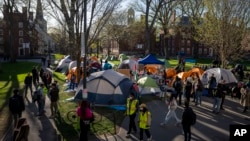
Protesters against the war between Israel and Hamas were voluntarily taking down their tents in Harvard Yard on Tuesday after university officials agreed to discuss their questions about the endowment, bringing a peaceful end to the kinds of demonstrations that were broken up by police on other campuses.
The student protest group Harvard Out of Occupied Palestine said in a statement that the encampment "outlasted its utility with respect to our demands." Meanwhile, Harvard University interim President Alan Garber agreed to pursue a meeting between protesters and university officials regarding the students' questions.
Students at many college campuses this spring set up similar encampments, calling for their schools to cut ties with Israel and businesses that support it.
The Israel-Hamas war began when Hamas and other militants stormed into southern Israel on October 7, killing some 1,200 people and taking 250 hostages. Palestinian militants still hold about 100 captives, and Israel's military has killed more than 35,000 people in Gaza, according to Gaza's Health Ministry, which doesn't distinguish between civilians and combatants.
Harvard said its president and the dean of the Faculty of Arts and Sciences, Hopi Hoekstra, will meet with the protesters to discuss the conflict in the Middle East.
The protesters said they worked out an agreement to meet with university officials, including the Harvard Management Company, which oversees the world's largest academic endowment, valued at about $50 billion.
The protesters' statement said the students will set an agenda that includes discussions on disclosure, divestment, reinvestment and the creation of a Center for Palestine Studies. The students also said that Harvard has offered to retract suspensions of more than 20 students and student workers and back down on disciplinary measures faced by 60 more.
"Since its establishment three weeks ago, the encampment has both broadened and deepened Palestine solidarity organizing on campus," a spokesperson for the protesters said. "It has moved the needle on disclosure and divestment at Harvard."
Chinese students report interrogations, deportations at US airports
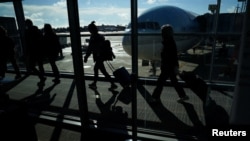
Academics from China are reporting increased scrutiny at U.S. airports, with valid visa holders being interrogated and turned away by Customs and Border Protection Agents.
Phones and laptops have been searched, and researchers have undergone extensive questioning about their work. One graduate student at Yale, who was midway through her PhD, was turned back at Dulles airport and banned from entering the U.S. for five years, according to The Guardian.





